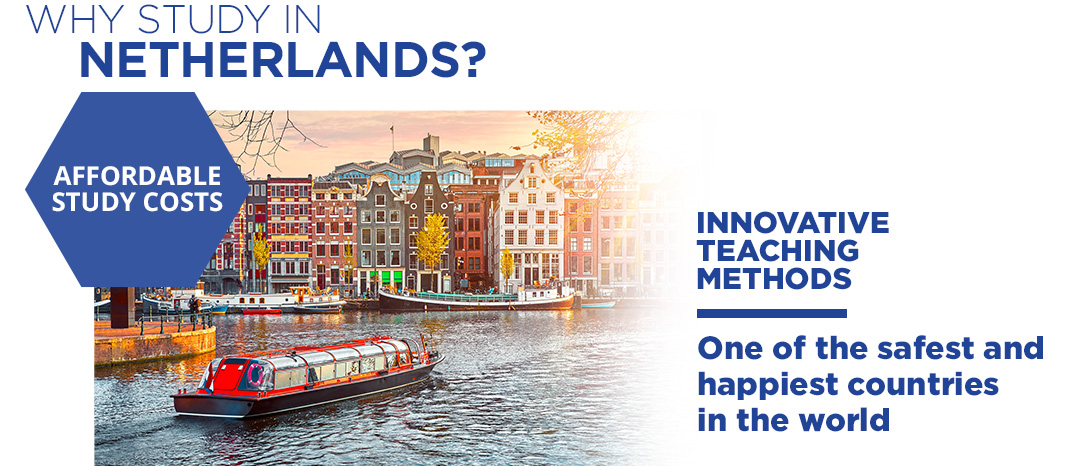Why Study in Netherlands?
Study in the Netherlands
The Netherlands, also known as Holland, is part of mainland Europe. It sits in Western Europe, with an extensive coastline to the North Sea, and shares land borders with Germany and Belgium. The Netherlands was the first non-native English speaking country to offer courses taught in English to international students. International students can study programmes in Dutch or English, making it a great option for studying abroad.
Study in Netherlands is similar to other popular study abroad destinations in terms of duration:
- Bachelor’s Degree (BA, BSc, BEng): 3-4 Years
- Masters Degree (MA, MSc, MEng): 1-2 Years
- PhD: 4 Years
The Dutch higher education system is made up primarily of three different types of institution. These are Research Universities, Universities of Applied Science and Institutes for International Education.
Certain degrees levels are only available from each institution type.
- Bachelors: Available at Research Universities and Universities of Applied Sciences
- Masters: Available at all Institution types
- PhDs: Available only at Research Universities
The Netherlands is an established and revered seat of higher education. In the 2016 QS World University Rankings, two Dutch universities are listed in the top 100. These are the Delft University of Technology and the University of Amsterdam.
Important information about choosing a Dutch Institution
Wide range of English programmes
Dutch universities offer the largest number of English-taught programmes in continental Europe. About 2,000 programmes are taught entirely in English.
Also, 95% of the Dutch speak English, so it’s easy to communicate in daily life.
Visas
As most courses and degrees run for more than one year most international students will require an entry visa called a Provisional Residence Permit or Machtiging tot Voorlopig Verblijf (MVV) in Dutch. Your MVV will allow you entry into the country for a six month period and once in the country you will need to apply for a Residence Permit – your chosen University should do this on your behalf.
A Provisional Residence Permit (MVV) will only be granted if your application meets certain requirements, including but not limited to:
- You must have a valid passport
- You have sufficient financial means
- All required fees have been paid
- You have a letter from your host University stating you have or will be enrolling
1. An international and multicultural environment
2. Affordable study costs
3. Innovative teaching methods
4. Affordable living expenses
5. A wide range of degrees taught in English
6. Excellent opportunities for travel
7. Internationally recognized degrees
8.Big international community
9.Great place to live
10.Excellent career opportunities
Blog
Internships
Abroad Internship’s In a globalized world, interning and living ...
Ukraine Work Permit
About Ukraine Ukraine, country located in eastern Europe, the second largest on ...
Croatia Work Permit
About Croatia Croatia became an independent nation on this ...













